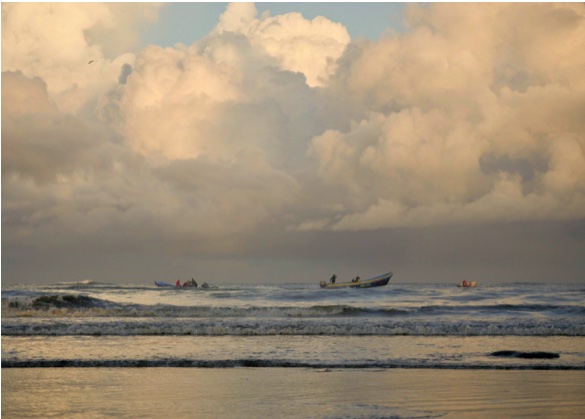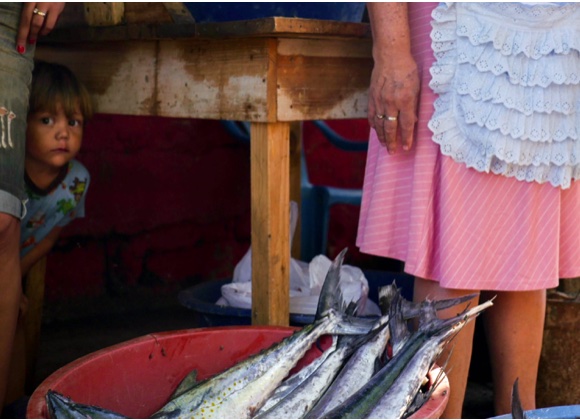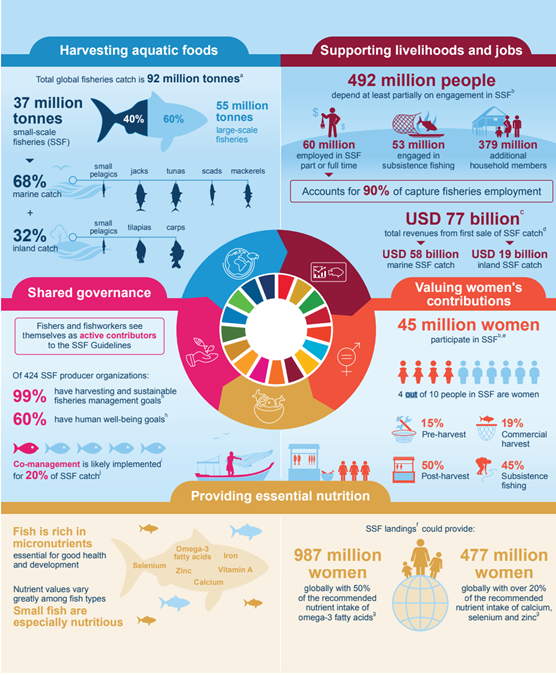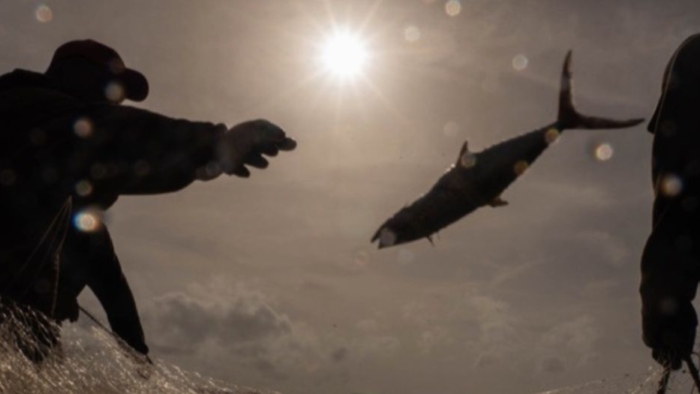By: Allison Cutting
We are all connected through one ocean.
The sea is teeming with life of incredible diversity — from blue whales being the largest animal to have ever lived to microscopic phytoplankton which produce half of the world’s oxygen. Bodies of saltwater link continents and people groups together, providing pathways of exploration and trade. The ocean can be a place of recreation and exhilaration, an expansive horizon that calms the human nervous system, and watery conditions that test the human limits. The sea supports regional ways of life and cultural practices, providing livelihood opportunities and a protein source by way of fish.
When was the last time you ate something from the sea? A fish stick or tuna sandwich, perhaps a sushi roll or raw oyster? The seafood we eat passes through many hands to go from sea, to ship, to shore, to store, before reaching our stomachs. Fishing has been part of society for centuries and plays a significant role in human and planetary development on a social, economic, and ecological level, and at a global scale. However, given that fish live underwater, and fishing takes place far out at sea, much of this sector’s activity has been unseen – a sort of hidden harvest of creatures from the deep, and the ramifications can be severe.

Fisheries developed as a field of scientific study in the mid 1900s. At this time, many started noticing that the once-held view of the ocean as an endlessly abundant source of marine life may have limits – and indeed it does. Scientists have since been collecting data on the health of the ocean and calculating how much fishing can be done while still sustaining fish populations. It must be noted that the act of fishing is not inherently bad for the oceans, but when mismanaged and done in excess, it puts undue pressure on marine biodiversity, and today over 30% of fish populations are caught at a rate faster than they can reproduce.
As of the early 2000s, scientists started noticing that numerous stretches of the ocean, and the marine life and people who dwelled there, were not being accurately accounted for – there remained gaps on data sheets, and potential shortcomings in management plans and policies which strived to steward the sea. Many of these data gaps were on what is known as small-scale, or artisanal, fisheries which consist of the capture of aquatic species via simple and/or traditional methods, in boats that are 12 meters or smaller, and are usually family and community based.
In such cases, people go out to sea or glean the shore for fish, which is then processed by other family and community members and either used for subsistence or sold in the local market or to a middle-man (or woman) for the export market. The rather informal, undocumented, nature of this sector makes it difficult track. Yet through innovative and interdisciplinary methods, previously unseen activity of marine and human life is becoming known and gaining attention. Today, we understand that small-scale fishers make up 90% of all fishers in the world and as a group are larger than all other marine sectors combined. They feed 3 billion people and support at least partial livelihood for 492 million people. Four out of ten people in the small-scale fisheries sector are women.

The contributions and challenges of the small-scale fisheries sector has largely been undervalued and overlooked in scientific and policy arenas, yet is gaining recognition through the Voluntary Guidelines for Securing Sustainable Small-Scale Fisheries in the Context of Food Security and Poverty Eradication (FAO, 2015), and the recently published Illuminating Hidden Harvests: The contributions of small-scale fisheries to sustainable development (FAO, 2023). These fisheries are complex social-ecological systems that support the Sustainable Development Goals (SDG) of SDG 14 life below water, SDG 8 decent work and economic growth, SDG 5 gender equality, SDG 2 zero hunger, and SDG 10 reduced inequalities.
To achieve real sustainability, inclusive of equity, we need to support shared goals that respect the human rights of those who live among and depend upon our planet’s natural gifts, while also respecting the rights of nature and planetary boundaries. Case studies have shown marine conservation initiatives are more effective when fishers are included. Furthermore, when narratives are at odds with the realities and values of fishers themselves, power imbalances will disproportionately impact coastal communities. The time is therefore ripe to include and listen to the voice of small-scale fisheries workers as part of the conversation on ocean conservation.

While there is much work to be done within science and policy arenas on the ocean and fisheries, our own individual and community posture and perspective is worth considering on this World Ocean Day (June 8), to reflect on with those we share the sea with. When we go to the water, let us not simply look at what is seen on the surface, rather, let us expand our view to see it more fully, to consider all that is connected through it – the creatures within it, the coastlines it touches, the humans dwelling at its edge, and the fishing communities it shapes. When we eat seafood, consider the life sacrificed to give sustenance. Eating is an act of participation in communing and connecting, and as such, an invitation for gratitude and reconciliation with our fellow humans, with creation, and with God. As Norman Wirzba puts it, we are “keepers of God’s edible garden,” – and in the case of fish, keepers of God’s edible ocean. May we learn to see and know the ocean with the fullness God intended.
For more information on this topic, check out the Outlaw Ocean Project’s podcast.









Add a Comment